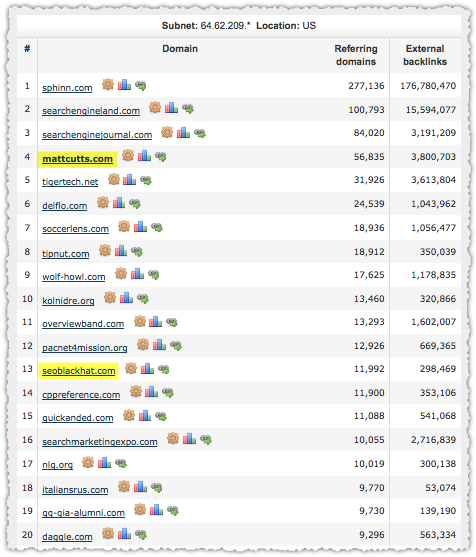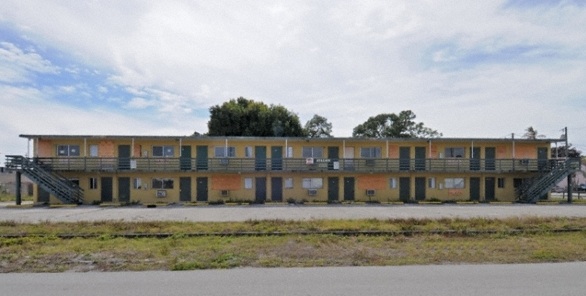What do Matt Cutts and Black Hat SEO have in common?

They share a C Block IP address.
OMG! Is this bad or dangerous? Here’s a fully non-technical explanation of C Block IP addresses and why you should or shouldn’t care about them.
What is an IP address?

An Internet Protocol (IP) address is essentially the computer address of a machine, in this case your site. It’s expressed as a series of four numbers (each between 0 and 255) separated by dots.
It might look something like 64.62.209.175
This is where you live. It’s home. Your little corner of the Internet.
What’s a C Block IP address?
You might get some conflicting results if you search for information on C Block IP because it often is confused with C Class IP addresses. For our purposes, the IP address is split into lettered sections (or blocks).
AAA.BBB.CCC.DDD
64.62.209.175 is in the same C Block as 64.62.209.10
The C Block is your neighborhood and those in the same C Block are your neighbors.
C Class IP addresses is a reference to the assignment of IP addresses. I’m not going to explain it further here because it just confuses the issue at hand. (If interested, here’s some basic information on IP Classes.)
C Block Links
The question that often comes up is whether links from the same C Block are some sort of red flag. For the most part, links from the same C Block aren’t a problem. It’s okay to get links from your neighbors.
But if you’re only getting links from your neighbors, things start to look a little fishy. Google might suspect that those neighbors aren’t entirely legitimate. A nefarious type might set up a slew of domains and have them all link to each other.
Links from 50 domains but just one C Block will look very strange. Links from 50 domains from 45 C Blocks will look just fine.
Bad C Blocks

Sometimes a bad element can move into your neighborhood. If you’re using a shared hosting provider you’re essentially living in an apartment building. Other people live at that address. If every one of them except for you is a notorious porn site, it might not look so great.
This could even happen on a larger level where an entire C Block has been used for some unsavory purpose. In this instance it’s not just one building that’s dilapidated, it’s the entire neighborhood.
Here’s what Matt Cutts had to say about it recently.
Check Your Neighborhood
Use the Majestic SEO Neighbourhood Checker if you’re moving into a new neighborhood or if you’re just interested in checking up on your neighbors. That’s how I stumbled upon this SEO C Block.
Sure enough mattcutts.com shares a C Block with seoblackhat.com, home of QuadsZilla. C Block neighbors also include Sphinn, Search Engine Land, Search Engine Journal, Wolf-Howl, Search Marketing Expo and Daggle.
None of these sites are getting dinged by association or even by the fact that they link to each other quite frequently.
TL;DR
An IP address is your home. The C Block is your neighborhood. C Block IP is really only important for SEO if you find out your IP is in a C Block slum.
The Next Post: How To Get Out of Panda Jail
The Previous Post: The Future of Search and SEO

9 trackbacks/pingbacks
Comments About What is a C Block IP Address?
// 25 comments so far.
Bored // June 24th 2011
Are you taking the piss with these posts?Your blog used to be useful, and now you post asinine crap… – time to unsubscribe!
aj // June 24th 2011
No, I’m not ‘taking the piss’ with these posts. There are quite a few questions about the potential risks of getting links from the same C Block and how shared hosting could damage your SEO.
This is just a quick and easy primer to dispel some of the FUD being circulated. You’re free to unsubscribe if you’d like Anonymous Commenter from the UK.
Brian Flores // July 19th 2011
Unfair and uncalled for comment by Anonymous Commenter from UK. While I understand the implications of linking from the same c-blocks, I had to explain the concept to my boss. This post does a better job. Great post!
– Brian Flores
Mark Henderson // March 07th 2012
I cannot tell you how much technical inaccuracy there is in your description of IP networking and how IP space is laid out. It annoys me that people read this stuff and then tout it as fact. See here for an example: http://serverfault.com/questions/367041/how-to-bind-c-block-ips-to-a-centos-server
So if you come across this blog post, the premise may certainly be valid, but the understanding of IP networks here is certainly flawed.
AJ Kohn // March 07th 2012
Mark,
Thanks for your comment and I can understand your frustration. However, you’ll observe that I explain that I’m not talking about IP Classes in this instance. In fact, I link to what I hope is a simple explanation of this concept. A few clicks away is also a straight-forward explanation of CIDR.
This is a non-technical explanation of C Block IP Addresses and why they might be important in relation to SEO. It is not a technical description of IP classes of IP networking. So, your frustration may be valid, but your understanding of this article is certainly flawed.
Tamra // May 22nd 2012
Thanks for the explanation. Clear, concise and up-to-date.
Having the video of Matt Cutts gave even more clarity to a sometimes unclear topic.
As for the naysayers, I find that most often naysayers already have a pre-determined notion of what you’re trying to say so they only pick out the parts that substantiate their negative concerns. Screw them.
For those of us that are looking for an SEO answer to an SEO issue, this post is perfect and you’ve made it clear that you’re not talking about IP classes. You even link to more information about that topic.
Good job. 🙂
Peter Marino // December 01st 2012
This is good info but just out of curiosity do you know which host MattCutts and SearchEngineLand.com use? It would probably be a good idea to be on the same Cblock/host as they are.
Peter
alentejo // March 09th 2013
I was doing some research on my own site, and I found out that I had 58 Linking C Blocks. I didn’t know what a C block was until I read your post. So thank you, your article and explaination was useful to me!.
AJ Kohn // March 09th 2013
Glad I could help Alentejo.
Mark Hill // March 13th 2013
Hi there,
I have no idea about this stuff, but here is my question.
I have 2 websites, both hosted with Hostgator the standard account, i have not linked the sites together in any shape or form, although they do operate in the same line of business.
Do i need to be worrying about all this C class IP stuff. Or is that mainly for people with a lot of domains that link them all up with one another.
Your advise would be really useful.
Mark
AJ Kohn // April 25th 2013
Mark,
No reason to worry about this with just two sites.
Vicki // July 17th 2013
Excellently explained article. People who know what they are talking about can explain things to non-techies, people who use jargon usually don’t know their subject well enough… unfortunately the internet seems to be full of the latter types of people.
Many thanks for the help.
From a non-techy SEO
WebPwnd // July 31st 2013
A very clean non-technical explanation….. getting into IP classes would be sticky at first and slippery at the end rendering your readers confused. Good job, just enough info for the SEO audience, as it is not meant for network administrators.
AJ Kohn // July 31st 2013
Thanks WebPwnd. This is definitely not for the net admin crowd. There’s far more complexity when you start talking about IP classes. It’s interesting but, as you say, not really applicable for this audience.
Gerald Vandeveer // October 23rd 2013
Good explanation. Networking is a completely different skillset. That is like wondering why the CAD designer of a car body can’t change out a piston ring in that cars motor… they aren’t related. So the idea that this should be worded for tech types is out of line.
Thank you for your “accurate enough” explanation of what C Block means in regards to the SEO.
Hardware Guy // November 18th 2013
It is really gr8 details shared about the class c block IP, I am a computer hardware engineer and was miss understood is with class C IP Address which started from 192.x.x.x and was always looking for the hosting on the IPs which lies in class C subnet. But today after reading this article I came to know that actually for hosting, SEO and links point of view the C class means the 3rd octet or 3rd block of any IP address and your website external links should come from different C Block IP address sites… Really Thumbs up…!!..
Jason in California // January 07th 2014
what if you are a personal website provider that also operates a consumer destinations site which is also your company flagship. As an example, let’s say Yahoo sold domain level personal template sites for businesses and they were all hosted on the same C block. At the bottom of each site there was a link that said ‘powered by Yahoo’ or within many of the sites there were content widgets with powered by Yahoo links. Would this harm Yahoo’s SEO in the eyes of Google?
Bren // January 15th 2014
Thank you for the dumbed down explanation. I’m not sure why some of those people commenting are reading the blog if they already have such a great understanding of everything. I, for one, really appreciate the way you explain it so even us lay people understand.
Nehru Place // January 18th 2014
It is a good explanation of C Class IPs in terms of SEO, even a lay man can understand it. Gr8..!!..
David // April 03rd 2014
Classfull networking ended in 1993, and even when it was used a class C address blocks were found in the range of 192.0.0.0 to 223.0.0.0. The replacement is called CIDR ( Classless Inter-Domain Routing).
What you are calling a class C address is a /24 block of IPs. An IPV4 address is a 32 bit number, the /24 means the first 24 bits indicate the start of the 256 IP addresses that follow.
If you would like more info check out
http://en.wikipedia.org/wiki/Classful_network#Replacement_of_classes
AJ Kohn // April 03rd 2014
David,
Did you read this post? I clearly state that I’m not talking about C Classes. That’s different than what this covers.
carole // June 21st 2014
Hey AJ,
Thanks for the explanation.
What about IPv6 Neighbourhood checking? There’s no C block on this protocol, right?
Any insights greatly appreciated.
Carole.
Baylane Promotions // September 12th 2014
I run the look up for my hosting and no bad sites seem to be on my shared hosting. However, I do not quite get how one would have links from those ips unless you were linking your own sites. Normally you would have links from different ips hosted at different places.
AJ Kohn // September 17th 2014
@Baylane
Two things here. Looking at who is on your shared host is looking at the quality of your neighbors. If your upstanding business is located on the same ‘block’ as all the hardcore porn then you might have a problem. As for getting links from the same IPs, ome create a number of sites (same IP) and link them together as well as all to their ‘money’ site in an effort to game search engines.
DAEHNOMEL // September 09th 2015
late to the retard party here. The author of this post clearly states, several times, that this is not an explanation of CIDR or classful IPv4 routing. This is the only truthful statement in the entire post. NONE OF THIS BS HAS ANY BASE IN EITHER CLASSLES OR CLASSFUL ROUTING AND YOU’RE AN IDIOT IF YOU BELEIVE ANY OF IT!!!
Sorry, comments for this entry are closed at this time.
You can follow any responses to this entry via its RSS comments feed.